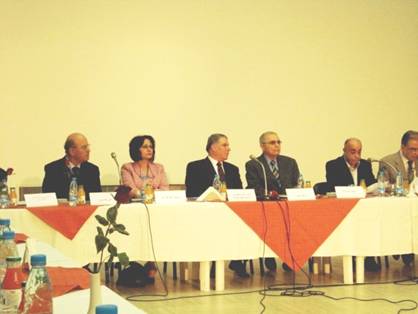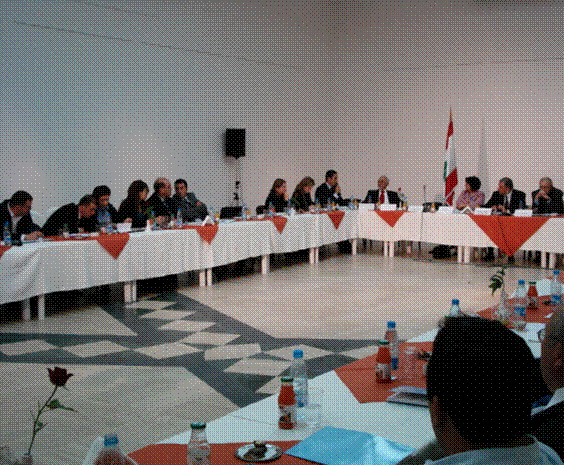LERC participates in a Workshop in Beirut on “The Role of the Lebanese Emigrants in the Development and Stability of Lebanon”
Thursday, 17th April 2008. UNESCO Palace, Beirut.
By Basma Abdel Khalek
Visiting Research Assistant
Under the patronage of the Ministry of Foreign Affairs and Emigrants and the General Directorate of Emigrants, a workshop entitled The Role of the Lebanese Emigrants in the Development and Stability of Lebanon.
The workshop focused on diaspora homeland development through inflows of remittances and investments, and through diaspora homeland politics through the lobbying role of the Lebanese emigrants in maintaining socio-political stability in the country and among them.
Dr. Jihad El Akl opened the session by articulating some of the major debatable emigration issues that would be discussed in the workshop including the political, economic and development role of the diaspora. The chair and the first speaker, the General Director of Emigrants Mr. Haitham Jumaa, explained the purpose of the workshop as an exercise aimed at enriching the Lebanese government’s knowledge on the topic especially that international migration has become an important topic of debate in both the sending and receiving countries. Mr. Jumaa announced the creation of the database aiming at registering the migration activity in Lebanon as a step forward towards statistical data collection.
Associate Director of LERC Ms. Guita Hourani was the first speaker. In her presentation entitled “Harnessing Diasporic Lebanese Riches to Promote Diaspora Homeland Investment”, Ms. Hourani opened her presentation with the following statement: “Less Developed Countries (LDCs) around the world are becoming more proactive in setting up programs to lure Foreign Direct Investment (FDI) and, if they are not succeeding to the extent needed, those with established diasporas are tapping into the riches of their expatriate communities to promote homeland investment.”
Ms. Hourani argued for the important role that expatriates play as investors in their homeland at times when these homelands are considered unattractive by most multinational corporations and how diaspora investments are believed to potentially improve the perception of foreign investors of the investment climates in these homelands. She cited China, Egypt, Afghanistan, and Palestine as examples of such positive role.
Ms. Hourani then discussed the investment potential of the Lebanese diaspora and the ability of the Lebanese economy to capitalize on such investments. Ms. Hourani emphasized the enabling environment of Lebanon to attract FDI, which includes incentives such as economic freedom, highly qualified human resources and excellent banking infrastructure among others. Ms. Hourani then stressed the fact that the physical and political insecurity in Lebanon has been the real barrier for foreign and diaspora investments in the country.

From left to right: Dr. Ali Faour, LERC Associate Director Guita Hourani, General Director of Emigrants Haitham Jumaa, Former Ambassador Riad Tabbara, Dr. Jihad El Akl, and Dr. Anis Abi Farah.
Ms. Hourani then ended her presentation by stating that Lebanese diaspora members, who have continuously demonstrated interest in their homeland, remain an untapped resource of investment capital for Lebanon, and harnessing their riches is likely to prove very advantageous for the Lebanese economy.
Dr. Tabbara spoke about emigration, forced migration and brain drain in general. He also spoke on the inflow and outflow of remittances in Lebanon. He mentioned the increase in the migration of young women. He suggested the reinvigoration of the Lebanese diplomatic representations abroad to better network with the Lebanese living there.

Participants and attendees at the UNESCO workshop on the role of Lebanese emigrants in the development and stability of Lebanon.
Dr. Ali Faour stated that emigration had become a human hemorrhaging and an outright theft of human resources. He spoke of development policies that would allow for a better management of migration. He suggested employing dialogue to solve problems, to stop violence and to end the environment of insecurity. He also proposed the enhancement of administrative decentralization and of the role of municipalities for better local development. He finally stressed the need to have a better way of collecting statistical data on migration.
Dr. Anis Abi Farah spoke of the comparative numbers of Lebanese residents and emigrants and briefed the audience on the profile of migrants from 1975 to 2001.
When the floor was opened the following interventions and suggestions were recorded: Permitting the regaining of Lebanese citizenship for those whose grandparents and parents lost it in the past and encouraging Lebanese expatriates to invest in Lebanon.